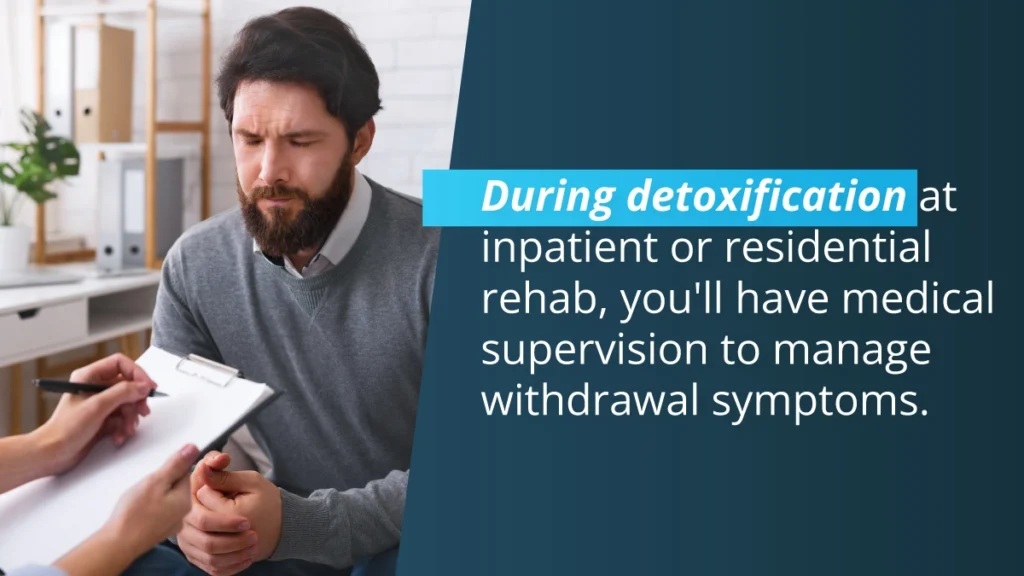People who struggle with severe addiction face complex life challenges. Such individuals can benefit from inpatient detox care to overcome drug or alcohol addiction. This level of care is designed to address underlying issues and ease the withdrawal process through tailored support, ensuring a safe process.
Inpatient treatment allows patients to concentrate entirely on their recovery, free from external distractions and influences. Patients receive various therapies and counseling sessions. They also have access to medical professionals for support and guidance. Continue reading to learn about the daily routine at an inpatient facility and how to choose the best facility for addiction recovery.
Key Takeaways
Inpatient detox is an intense level of care to help patients overcome substance addiction under medical care. Here’s what you need to know:
- Inpatient detox treatment is designed to eliminate harmful toxins from the body in a structured environment with medical support.
- The process helps patients manage triggers and ease withdrawal symptoms in order to overcome drug misuse.
- Structured daily routines and activities during the stay help people focus on their recovery.
- Choosing a suitable facility involves evaluating services and staff expertise and ensuring a safe, supportive atmosphere.
The Haven Detox-New England offers detox programs with holistic services. For more information, call us today at (844) 933-4145.

Importance Of Inpatient Medical Detox
Inpatient medical detox is a structured treatment approach for those facing severe withdrawal symptoms from alcohol or drug use. It involves staying in a specialized facility where medical care is available 24/7. With prescription medications and tailored treatment plans, this process ensures a safe transition into recovery.
This program offers continuous monitoring, allows healthcare professionals to adjust medications as needed, and provides immediate care for complications. This approach helps identify underlying medical conditions or mental health issues, ensuring comprehensive care during the recovery process.
Inpatient alcohol rehab is beneficial for people with complex medical conditions or co-occurring mental illnesses requiring constant supervision during detox. With a comprehensive treatment plan, inpatient detox offers a strong foundation for long-term healing and recovery.
Inpatient Detox Procedure
Inpatient detox is a vital first step in overcoming substance abuse. It involves medical detoxification in a safe, structured setting. Here’s a brief overview of what to expect:
Initial Assessment
The process starts with an initial assessment. That includes reviewing your medical history, physical symptoms, and substance use. The assessment helps create a personalized detox plan tailored to your needs.
Detoxification Phase
During detoxification at inpatient or residential rehab, you’ll have medical supervision to manage withdrawal symptoms. This phase focuses on treating mental and physical withdrawal symptoms and helping patients manage triggers to lower the risk of relapse. Facilities offer comprehensive services, including counseling and support groups, to make the process comfortable and safe.
Transition To Aftercare
After inpatient detox, the next step is planning for ongoing addiction treatment. Facilities help you transition smoothly into an outpatient program, aiming for long-term recovery. The goal is to prepare you for continued care and support your recovery.
Life At Inpatient Detox Rehab
Life at an inpatient rehab facility is structured and supportive. Each day is designed to help individuals with substance use disorder focus on recovery in a safe place. Here’s what you can expect:
Morning Activities
The day usually starts with a structured schedule, including nutritious breakfast and group sessions. These sessions often include support groups where you share experiences and receive emotional support.
Therapy Sessions
You will attend various therapy sessions throughout the day, including individual counseling and family therapy. These sessions help address the emotional and psychological aspects of recovery.
Activities And Classes
The facility offers educational classes and activities, including yoga and meditation. This routine helps manage withdrawal effects such as nausea, body aches, and anxiety.
Evening And Follow-Up
In the evening, you might have time for relaxation and reflection. Follow-up treatment plans are discussed to ensure you have a clear path for continuing care after the residential program. Each day is designed to support you through the challenges of withdrawal management and prepare you for a successful recovery.
Choosing An Inpatient Medical Detox Facility
Choosing the right inpatient medical detox facility is crucial for a successful recovery. Start by gathering information about different facilities, focusing on those with a comprehensive approach to detoxification and recovery.
Look for facilities that offer access to experienced clinical staff and multidisciplinary teams. It’s essential to check the range of services, including medical care, emotional support, and therapy options.
A well-rounded facility will have specialized teams to address various needs and offer continuous support. Additionally, visit the facility or read online reviews to ensure it provides a safe and comfortable environment. You should ensure the facility’s approach aligns with your recovery goals and that you feel confident in their care.
Frequently Asked Questions (FAQ)
How does a detox work?
Detox helps the body remove harmful substances like drugs or alcohol. It usually starts with a medical evaluation to ensure safety. Then, individuals stop using the substance and receive support to manage withdrawal symptoms.
The detox process involves medications, counseling, and a safe environment. The goal is to help the body adjust to substance-free life while providing emotional and medical support. After detox, an individual is prepared for further treatment and a healthier lifestyle.
How do you help someone after detoxing?
After detox, supporting someone involves several key steps. First, encourage them to join a treatment program for ongoing support and therapy. Help them find counseling or support groups to manage cravings and build healthy habits.
Be patient and offer emotional support as they adjust to life without substances. Assist with daily tasks and routines to create a stable environment. Finally, encourage a healthy lifestyle with good nutrition and regular exercise to promote well-being.
What is inpatient medical detox?
Inpatient medical detox is a structured and supervised process where individuals undergo withdrawal from drugs or alcohol in a hospital or specialized facility. It provides 24/7 medical care to manage withdrawal symptoms, which can be severe or life-threatening depending on the substance and the individual’s health.
The process involves monitoring vital signs, administering medications to ease symptoms, and providing emotional support. Inpatient detox is typically the first step in a comprehensive addiction treatment plan, ensuring the patient is stabilized before transitioning to further care, such as residential treatment or outpatient therapy. This environment is safe, controlled, and designed to prevent complications, making it ideal for those with severe addictions or co-occurring medical conditions.
Aim For A Healthy Tomorrow With The Haven Detox-New England
If you or someone you know is dealing with substance addiction, then reach out to The Haven Detox-New England.
At our facility, we offer residential treatment in a home-like setting where our patients can receive a medical detox program tailored for effective recovery and lasting sobriety from alcohol and drugs. This program is designed to remove harmful toxins, alleviate pain, and ease discomfort experienced during withdrawal.
During this program, in addition to 24/7 care our certified team of professionals also offers holistic therapies, medication assistance, and counseling from certified medical professionals to overcome addiction.
Start working toward a healthier future today. Contact us at (844) 933-4145 today.




